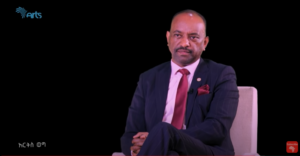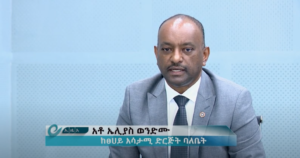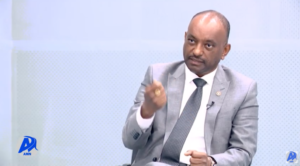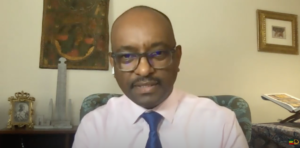TADIAS MAGAZINE – In sixth century Ireland, a king was asked to adjudicate one of the world’s earliest legal cases concerning book piracy. A monk named St. Columba had admitted copying by hand, apparently without permission, a manuscript that belonged to another writer. The original author accused St. Columba of theft and illegal copying, arguing that the book was his brainchild. In his famous ruling against the pirate-monk, the king pronounced: “To every cow belongs her calf, to every book belongs its copy.” In other words, only the publisher has the legal right to control its intellectual property.
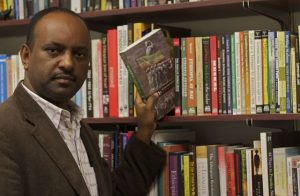 This brings us to the modern day piracy of Mengistu Hailemariam’s memoir that was recently scanned and distributed without authorization from the book’s copyright holder Tsehai Publishers. Unlike St. Columba, however, the responsibile party in the Mengistu case remains, at least for now, faceless behind the computer screen, and communicates only via a website based in Europe. The copyright infringers claim justification under the “Son of Sam Law,” an American law designed to prevent criminals from profiting from the publicity of their crimes.
This brings us to the modern day piracy of Mengistu Hailemariam’s memoir that was recently scanned and distributed without authorization from the book’s copyright holder Tsehai Publishers. Unlike St. Columba, however, the responsibile party in the Mengistu case remains, at least for now, faceless behind the computer screen, and communicates only via a website based in Europe. The copyright infringers claim justification under the “Son of Sam Law,” an American law designed to prevent criminals from profiting from the publicity of their crimes.
We recently spoke to Elias Wondimu, Publisher & Editorial Director of Tsehai Publishers about the controversy.
TADIAS: Thank you Elias for your time. Please tell us about the recent unauthorized distribution of Tsehai Publishers’ Mengistu Hailemariam’s memoir. What exactly happened?
Elias Wondimu: On Jan. 14th, Debteraw, an EPRP affiliated website based in the UK along with Finot Radio, scanned the book and distributed it for free on the Internet. The group explicitly stated that their actions were in protest of Col. Mengistu Hailemariam’s book. This was done maliciously, attempting to punish the publisher for daring to produce the book. They also hoped to discourage us from publishing future books by Col. Mengistu or similar authors that they don’t agree with.
In “About us” section of their website, it states that they are “campaigning” for “free and independent media.” But, their recent actions have shown the hypocrisy of their claims. By trying to silence me as a publisher, they violated all notions of freedom of press and freedom of expression. Apparently, for this sect of the EPRP, “free and independent media” refers only to publications that align with their own views.
TADIAS: Where were you when you first learned of this? How did you feel?
EW: When I first heard the news, I was in my office working on our next book, a memoir by Rita and Richard Pankhurst, which was to be released next month. Since we’re in the final stages of editing, I was working late on a Friday night. At 9:00pm I received a phone call from a friend. He asked me in a distressed voice if I knew what had happened. When I said that I didn’t, he directed me to the website, where I saw the article. I clicked on the link and saw the entire book I had worked so hard on download onto my computer. At first I thought it was just a prank or some sort of a bad joke and didn’t take it seriously. I couldn’t even fathom something like that being done.
The first thing I did was to see if there was any altered content in the scanned file. I noticed that, while it contained all the front matter such as the contents, copyright page, and publisher’s note, I noticed that six pages at the end had been removed. These pages contained our best books that we thought that our readers should know and other upcoming Tsehai Publishers books. Even now, I am still puzzled why they did this.
Thinking they will take it down when they realized what they have done, so I didn’t do anything. But, when Monday came around I realized the gravity of the situation, and that I would have to take legal action. There are no words to describe the frustration I felt. After working so hard and devoting my life to the cause of freedom of press in Ethiopia and around the world, I could not imagine that something so devastating could happen. But, although I was discouraged and angry, I knew that I had to keep fighting for what I believed in.
TADIAS: Please tell us more about the book. How did you obtain the content?
EW: It has now been almost seven years since I was introduced to Col. Mengistu. Since I received the first manuscript, my staff and I have worked tirelessly to bring the book to press, preserving the highest quality of publication that is accustomed with Tsehai. As I wrote in the Publisher’s Note, this book is the first time in our long history that an Ethiopian leader has written a book, sharing his experiences after leaving office. Even though Emperor Haile Selassie was the first to write a two-volume political memoir while in power, throughout Ethiopian history, none of our leaders lived longer to tell us their experiences and challenges while ruling the country. However, we have had many chronicles, most of these were written much later on by people who had a political bias either for or against them.
This book gives us an unparalleled window into how the government was run. It also presents some of the major issues in our history, such as how the Derg was formed, and how some of the major governmental decisions were made, how the Somali war was started, and Ethiopia’s victory came about. Despite what others or even I might think about Col. Mengistu himself, I am proud to give the first unadulterated first-hand account from an Ethiopian leader. The publication of this book is a historical moment, and I wholeheartedly stand behind its publication.
TADIAS: Debteraw.com has issued the following comments in justifying their actions: “Mass murderer and brutal dictator Mengistu Haile Mariam (exiled in Harare, Zimbabwe) has written a 500+ pages book that has been published by Tsehai Publisher[s] of Los Angeles. This mass murderer has not yet atoned or paid for his horrendous crimes and the mass killings of the Red Terror. He now hopes to benefit from the sale of his book of lies. We strongly feel that this criminal should be tried before a court of law and should be hindered from benefiting from his crime. Thus, we have published the book in PDF and we are posting it for free usage of all interested readers.” They also say that they are legally justified. What is your response and what steps are you currently taking to halt the piracy?
EW: Professional publishers publish books coming from various political and ideological quarters and by people who have been involved in all kinds of activities. This does not mean publishers agree with the contents of the book they publish. Publishers are not politicians or judges. They are not agents of censorship. They believe in freedom of expression, in the intelligence of the reading public, its capacity to separate the wheat from the chaff and to make informed judgments. This is precisely the perspective of Tsehai publishers also.
The claim “that they are legally justified” is a false one. There is no law that permits the violation of copyright laws. In fact, what they did is nothing less than a blatant violation of internationally accepted copyright laws.
Currently, we have retained a law firm known for its intellectual property law, including copyright and book publishing works. Our attorney, Steven Rohde, is the Past President of the Beverly Hills Bar Association, President of the American Civil Liberties Union of Southern California, and vice president of PEN USA. Among many accomplishments, representing a different client a few years ago, Mr. Rohde personally took the California Son of Sam Law to the California Supreme Court and the law was struck down as a violation of the First Amendment protection for free speech and free press. So, Debteraw and its associates have seriously misunderstood the nature of the Son of Sam Laws and their legal status.
TADIAS: We also understand that this is Tsehai Publishers’ 10th year anniversary. Congratulations. Do you have any plans for the anniversary?
Thank you! Even though Tsehai was started couple of years earlier, it was ten years ago this time that I dedicated my full time attention into it. So we are very excited to celebrate a decade at Tsehai.
To celebrate the anniversary, we decided last year to publish a book every month in 2012. Because of the recent events, we were forced to postpone the publication of our first book this month. But we are determined not to let the unfortunate circumstances hold us back any more than this. We plan to get back on track and plan to release a book every month from February on.
We are also planning to host public events in selected cities in the coming months. If your readers would like to be informed or to get involved, we highly encourage them to visit and Like us at our Facebook page.
TADIAS: Please tell us briefly about Tsehai Publishers’ inception and key works in the past ten years.
Living in Los Angles in the mid 1990s, I noticed a major void in the publishing field on the subject of Ethiopia. Hardly any literature was available on Ethiopia, and what was there was seriously incomplete and flawed. I was tired of waiting for change to happen, and decided to take matters into my own hands. I founded Tsehai in 1997 with just this aim. Tsehai was named after and dedicated to my mother who had passed away the same year. In 2001, I left a job at UCLA and began running Tsehai full time. Since then Tsehai has published over 60 books, started three academic journals, and founded three imprints—African Academic Press, Marymount Institute Press and Chereka Books.
Over the years we have published many books that I am very proud of, one of which is The Conquest of Abyssinia. In the current religious and social climate in the world, Ethiopia is at the crossroad of fundamentalism, and has experienced it all. This book gives the first hand account of what happened during the tumultuous religious conflict in Ethiopia. Another notable book is Ethiopia and Eritrea, which was published originally in 1952. The book documents the struggle between the Unionists and Separatists in Eritrea. Currently, situations in Eritrea are not going well. Although the areas are separated politically, people are beginning to understand that they need a common ground. Because of the Separatists hold a monopoly over the literature available, the young Eritreans are not able to access information about their grandfather’s struggle to reunite with Ethiopia. This book is our contribution to the people of Eritrea, giving them back a piece of their lost history. Finally, our book The Evolution of the Ethiopian Jews addresses the ever-increasing number of Ethiopian Jews that now live in Israel. The book documents their incredibly complex history, from a captivating Ethiopian perspective. Similarly, all our books are selected and published to address issues that are affect our understanding and engagements among ourselves today.
TADIAS: What about the various journals you have started. What inspired them?
EW: Early in 2000, I was working at UCLA for Azlan a journal of Chicano Studies. The journal had been founded 30 years ago by Chicano students who were looked down on because of their Mexican heritage. These students realized that if there was to be any hope for their own academic future and next generations, they would need a forum for Chicanos to publish, which was non-existent at the time. The journal is now a major international academic platform and most scholars who published in it are leading figures in the field internationally. This story inspired me to do the same for Ethiopian Studies, which was just as lacking on the market. Except the one at Institute of Ethiopian Studies at Addis Ababa University, all the scholarship on Ethiopia was produced by European and American institutions. This was the impetus to begin the academic journals at Tsehai.
Our first journal was the International Journal of Ethiopian Studies (IJES), which is now currently available on JSTOR. IJES was the first academic journal to be started by an Ethiopian institution outside of Ethiopia. With the help of leading scholars in the field, we created a nurturing environment where academicians could publish scholarly theoretical and empirical papers and their research findings on Ethiopian social, political, economic, cultural and historical issues.
Our second journal is the Ethiopian Journal of Religious Studies (EJRS), which tackles the complex religious climate of the Horn of Africa. Ethiopia is the home of the major religions in the world, but there was previously no forum where we can study or document its development. EJRS is the first religious Ethiopian journal, and is breaking new ground on this fascinating subject.
Our most recent journal is Ethiorica, which combines the words “Ethiopia” and “America” or “Africa.” Although Ethiopia has a very long and rich literary culture, there is currently no platform for burgeoning writers to show their talent. Because of this, there is no stimulating forum for inspiring and promoting Ethiopian literature, particularly among the youth. Ethiorica was our way of addressing this issue. The journal gives a platform for the best new writers to showcase their writing.
TADIAS: We know that you are also in the process of launching a children book series, tell us about it?
EW: We created an imprint called Chereka Books and it is dedicated to bringing accessible, joyful, and child-friendly illustrated books to children and young readers. These books are intended to entertain, inspire, and educate the children their culture and history. Currently, we have about twenty books in different stages of development and we will announce the details soon. In the mean time, you can be sure that the stories, illustration and production of the books will be as good or better than the many books that we have produced in the past.
TADIAS: Please share with us about yourself as well (where you grew up, how you developed your passion for publishing)
EW: I was born and raised in Addis Ababa. Although I had originally planned to pursue a career in medicine, I gave up that path and resolved to become a journalist. I believed that this would enable me to make the greatest difference for my country and in the world.
In September 1994, I left Addis to participate in the Twelfth International Ethiopian Studies conference at Michigan State University in East Lansing. But, my three-week travel plans became indefinite when the government clamped down on the press. Later that year, I joined the Ethiopian Review magazine in Los Angeles, serving as its editorial staff for the next six years. In these years, I got to work with many scholars, political activists and public intellectuals on issues of local and global interest.
As a journalist, I had fought for the freedom of press and expression, and these experiences made me realize that I wanted to continue this through publishing. I cared deeply about Ethiopia and wanted to make my contribution by publishing and distributing works of scholarship on Ethiopia by Ethiopians and non-Ethiopians throughout the world. After founding Tsehai, I realized how very rewarding the experience could be, and devoted myself fully to it. Today, with our three imprints, we publish a diverse list of books and journals, and we endeavor to encourage the acquisition of knowledge and to bring quality and diversity to the publishing industry for many generations to come.
TADIAS: Is there anything else you would like to share with our readers that we have not asked you about?
EW: I would like to remind your readers of one fundamental issue. Circumstances in Ethiopia and elsewhere show how precious freedom of expression is. Without freedom of expression, there is no progress, no development, no democracy, and no vibrant culture. Ethiopia has lost many of her brilliant children because they stood up to defend freedom of expression. According to my humble opinion, it is our duty to struggle for freedom, equality, and justice to defend the freedom of expression of all Ethiopians, at home and in the Diaspora.
Last but not least, I would like to use this opportunity to say thank you to the many who came out in our support, donated money, purchased books, called and emailed to show their solidarity. We are also grateful to the wonderful editors, authors, staff, and interns who work so hard to contribute knowledge that heals our wounded souls. You all are our heroes, so thank you!
SOURCE: By Staff Writer, TADIAS Magazine; Photo by Miss Scott
—–
Related:
Illegal PDF of Mengistu Haile Mariam’s Memoir – By Donald N. Levine (TADIAS)
Ethiopia: Copyrights and CopyCrimes – By Alemayehu G Mariam (Ethio Media)
In defense of Tsehai Publishers – By Fikre Tolossa (Ethiopian Review)


